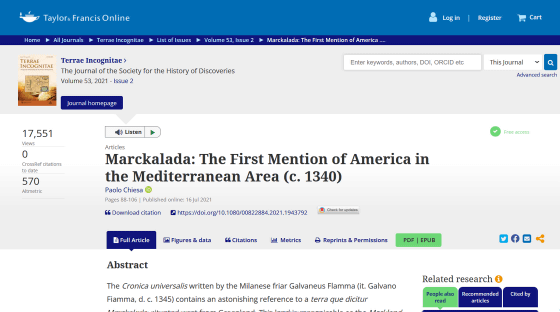Europeans may have known the existence of the Americas 150 years before Columbus arrived

Recent
Full article: Marckalada: The First Mention of America in the Mediterranean Area (c. 1340)
https://www.tandfonline.com/doi/full/10.1080/00822884.2021.1943792

Italian sailors knew of America 150 years before Christopher Columbus, new analysis of ancient documents suggests
https://phys.org/news/2021-10-italian-sailors-knew-america-years.html
Mysterious Text Suggests Europeans Knew of America Long Before Columbus Set Sail
https://www.sciencealert.com/ancient-texts-suggest-italian-sailors-knew-about-america-way-before-columbus
Professor Paolo Chiesa, a professor of medieval Latin literature at the University of Milan, Italy, investigated the description of the book 'Cronica universalis ' written by Dominican monk Galvano Fiamma, who was active in Milan in the 14th century.
Cronica universalis is a three-volume Latin book, written around 1345, detailing the history from God's Creation to the time of writing, and is considered to be Fiamma's last work. In addition to history, the third volume also provides a geographical explanation of the exotic region, which mentions the land 'Marckalada' west of Greenland.
Chiesa translated and analyzed Cronica universalis, and after the description corresponding to Iceland and Greenland, 'There is a land called'Marckalada'where giants live further to the west. This land must be a giant. There is a building made of large stone tablets that cannot be built, and there are also green trees, animals, and many birds, but sailors who knew certainty about the land and its characteristics. I didn't. ' Chiesa claims that the description of Marckalada is immature, but the first reference to the Americas in the Mediterranean region.

Chiesa believes that Fiamma's geographic description came
Marckalada written by Fiamma is thought to correspond to Markland that appears in ' Saga of the Greenlanders ' and ' Saga of Erik the Redhead', and the description that there are abundant trees and animals is also explained by Marckland. Matches with. Marcland is said to correspond to the Labrador region and Newfoundland Island in modern northeastern Canada.
'There is no reason not to believe in Fiamma. It has long been noted that the 14th century Portolan charts in Genoa and Catalonia provide a high degree of geographical representation in northern Europe. 'These notions of the northwestern region were most likely brought to Genoa through routes through the British Isles and the continental coast of the North Sea. At that time, sailors from Italy and Catalonia reached Iceland and Greenland. There is no evidence of this, but it was certainly possible to obtain goods from the region from Nordic merchants and ship them to the Mediterranean region. The ones mentioned by Fiamma fit this dynamics. Genoese people from Scotland and We may have brought back news about these lands that we heard from our trading partner sailors at ports in the United Kingdom, Denmark and Norway. '

The findings suggest that Italians may have known about 'land west of Greenland' nearly 150 years before Columbus reached the Americas. 'It's easy to imagine Columbus (who was born in Genoa) heard about North American lands from a sailor who visited the harbor,' said Science Alert, a scientific media outlet.
Related Posts:
in Note, Posted by log1h_ik







